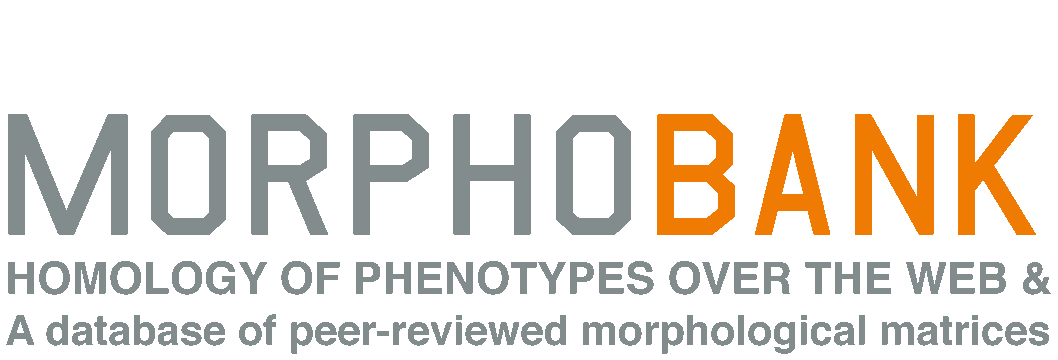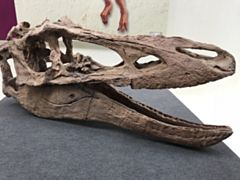Project 4311: W. Foster, S. L. Brusatte, T. D. Carr, T. E. Williamson, L. Yi, J. Lü. 2021. The cranial anatomy of the long-snouted tyrannosaurid dinosaur Qianzhousaurus sinensis from the Upper Cretaceous of China. Journal of Vertebrate Paleontology. 41 (4):null.
Abstract
Tyrannosaurid theropods topped the terrestrial food chain in North America and Asia during the latest Cretaceous. Most tyrannosaurids, exemplified by Tyrannosaurus rex, had deep snouts, thick teeth, and large jaw muscles that could generate high bite forces. They coexisted in Asia with a morphologically divergent group of long-snouted relatives, called alioramins. Qianzhousaurus sinensis, from the Maastrichtian of Ganzhou, China, is the largest alioramin yet discovered, but has only been briefly described. Here we present a detailed osteological description of the holotype cranium and mandible of Qianzhousaurus. We identify several new autapomorphic features of the genus, and new synapomorphies that unite alioramins (Qianzhousaurus, Alioramus altai, Alioramus remotus) as a clade, including a laterally projecting rugosity on the jugal. We clarify that the elongate skull of alioramins involves lengthening of the anterior palate but not the premaxilla, and is reflected by lengthening of the posterior bones of the lower jaw, even though the posterior cranium (orbit and lateral temporal fenestra) are proportionally similar to deep-skulled tyrannosaurids. We show that much of the variation among the alioramin species is consistent with growth trends in other tyrannosaurids, and that A. altai, A. remotus, and Qianzhousaurus represent different ontogenetic stages of progressive maturity, across which the signature nasal rugosites of alioramins became less prominent. We predict that the holotype skull of Qianzhousaurus represents the adult level of maturity for alioramins, and propose that the skull morphology of Qianzhousaurus indicates a much weaker bite than deep-skulled tyrannosaurids, suggestive of differences in prey choice and feeding style.Read the article »
Article DOI: 10.1080/02724634.2021.1999251
Project DOI: 10.7934/P4311, http://dx.doi.org/10.7934/P4311
| This project contains | Matrices |
|---|---|
Download Project SDD File | Total scored cells: 117 Total media associated with cells: 0 Total labels associated with cell media: 0 |
| Characters | |
| Total characters: 35 Total characters with associated media: 0 Total characters with media with labels: 0 Total character states: 71 Total character states with associated media: 0 Total character states with media with labels:0 Total unordered/ordered characters:35/0 |
Currently Viewing:
MorphoBank Project 4311
MorphoBank Project 4311
- Creation Date:
11 July 2022 - Publication Date:
17 September 2022 - Matrix downloads: 4

This research
supported by
Authors' Institutions ![]()
- New Mexico Museum of Natural History and Science
- University of Edinburgh
- Carthage College
- Chinese Academy of Geological Sciences
- Ganzhou Museum
Members
| member name | taxa |
specimens |
media | chars | character
| cell scorings (scored, NPA, "-") | cell
| rules | ||||||
| Bidane Martinez Huerta Project Administrator | 4 | 1 | 1 | 35 | 0 | 0 | 117 (117, 0, 0) | 0 | 0 | 0 | ||||
Taxonomic Overview for Matrix 'M28932' (4 Taxa)
| taxon | unscored cells |
scored cells |
no cell support |
NPA cells |
"-" cells | cell images | labels on cell images |
member access |
| [1] Artifcial embryo Taxon name last Modified on 08/26/22 | 0 | 35 | 35 | 0 | 0 | 0 | 0 | 1 |
| [2] † Alioramus altai Taxon name last Modified on 08/26/22 | 0 | 35 | 35 | 0 | 0 | 0 | 0 | 1 |
| [3] † Alioramus remotus Taxon name last Modified on 08/26/22 | 23 | 12 | 12 | 0 | 0 | 0 | 0 | 1 |
| [4] † Qianzhousaurus sinensis Taxon name last Modified on 08/26/22 | 0 | 35 | 35 | 0 | 0 | 0 | 0 | 1 |
Project downloads 
| type | number of downloads | Individual items downloaded (where applicable) |
| Total downloads from project | 7 | |
| Matrix downloads | 4 | W. Foster et. al (2021) (4 downloads); |
| Project downloads | 3 |

